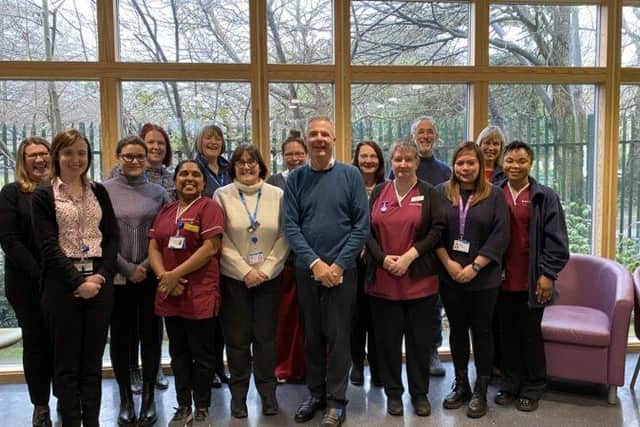NHS: Innovative digital system helps improve access to breast screening in Sussex
and live on Freeview channel 276
The new system, which is now used by more than 150 GP surgeries, is part of a local action plan to get more people to attend their screening and is the first system of its kind in the country.
UHSussex provides two breast services, one for East Sussex, based at the Park Centre in Brighton, and the other in West Sussex, based at Worthing Hospital, as well as seven mobile breast screening units located throughout Sussex.
Advertisement
Hide AdAdvertisement
Hide AdSteve Dixon, Project Lead for the Integrated Breast Services said: “We are continuously looking at ways to increase uptake for breast screening across Sussex.“Screening helps find breast cancers before they present noticeable symptoms.


"Finding breast cancers early often results in less aggressive treatment and improved quality of life, better overall health and well-being for those diagnosed.
The IT system used by all breast screening units across the country generates paper results reports that are posted to surgeries. This report contains the results of those patients who recently attended or did not attend their breast screening appointment.
UHSussex breast services send around 85,000 paper reports a year to GPs – that’s approximately 1,600 a week.
Advertisement
Hide AdAdvertisement
Hide AdHowever, this paper-based system has created national problems, as surgeries must review and input these paper results onto their system manually which can lead to data entry errors.
GP surgeries must have up-to-date results to enable them to target their patients who are due an appointment, so if incorrect results are entered onto the system, this can lead to invitations being sent to unsuitable patients.
This issue would cause unnecessary distress and led some patients to decline their screening.
To address this problem, colleagues from Integrated Breast Services, alongside IT, and other partner organisations, created an electronic system that allows them to send these result reports to GPs electronically.
Advertisement
Hide AdAdvertisement
Hide AdThis digital system also allows practices to input patient data more effectively, reducing the risks of data entry errors and ensuring the right patients are communicated with.
After carrying out pilots of the new electronic reports with local GPs, the new system received very positive feedback, including how efficient it was – estimating it had halved the time it took them to process paper-based reports.
Elizabeth Cross, Data Lead at Henfield Medical Centre in West Sussex, said: “Receiving these reports electronically has made it ten times easier on our admin staff and not having to rely on when or if the post has arrived is wonderful.
“Not needing to wait for the post to be opened, date stamped and scanned to then process the screening results is so much easier for our workflow staff and they have found electronically processing it easier.”
Advertisement
Hide AdAdvertisement
Hide AdBreast cancer is one of the most common types of cancer in the UK, affecting around one in seven women in their lifetime.
Most women diagnosed tend to be over 50, but younger women and men can also get it.
There can be minimal signs and symptoms of breast cancer, which is why it is important to keep a close eye on what is normal for you.
Symptoms of breast cancer can include a lump or change in the look, shape, or feel of one or both breasts. Experts say that most breast lumps are not cancerous, but it’s always best to have them checked by booking an appointment with your GP.
Advertisement
Hide AdAdvertisement
Hide AdDr Tina George, Clinical Director for Cancer at NHS Sussex, added: “Screening detected cancers are often found at an earlier stage. This is good news based on figures from Cancer Research UK, which show that if breast cancer is found at stage one (the earliest stage), 98% people will survive that diagnosis for at least five years but this figure drops to approximately 27% if diagnosis doesn’t happen until stage four.
“Checking your breasts, knowing what’s normal for you and attending your routine screening appointments is crucial for early diagnosis.
“I am delighted to see this new project working, which embraces digital technology and supports patients with vital screening by speeding up the process.”
Following these successful pilots, the system was implemented Sussex wide, and its development is being shared with other breast screening services across the country.
Advertisement
Hide AdAdvertisement
Hide AdBoth screening services are now meeting the NHS standard and achieving more than 70 per cent of patients attending their appointments.
The team are now working on the next phase of this project which includes developing a standard system that shows any additional needs patients may have, such as having a disability or needing a translator, to ensure their comfort and help improve their experience during their appointment.
They will also be taking further steps to tackle healthcare inequalities by identifying which groups are being missed and where efforts should be focused to increase uptake.
To find out more about breast screenings, including eligibility and screening locations, visit: www.uhsussex.nhs.uk.